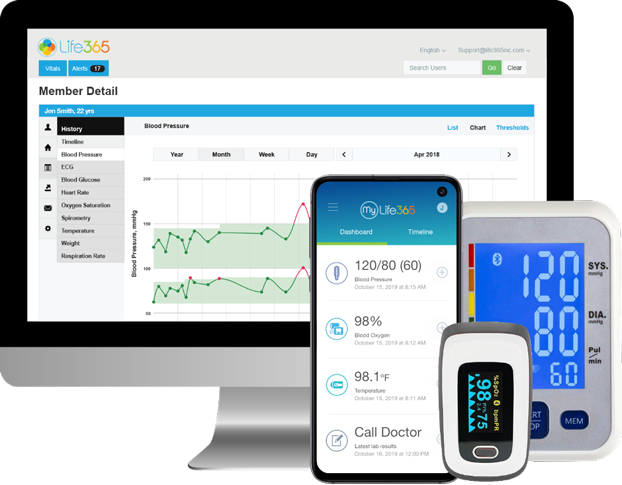Kent E. Dicks, Founder & CEO of Life365, shares his perspective on how telemedicine and virtual care can help address the VA’s growing physician shortage and expand access for veterans.
According to the Center for Connected Health Policy, “Remote patient monitoring (RPM) uses digital technologies to collect medical and other forms of health data from individuals in one location and electronically transmit that information securely to health care providers in a different location for assessment and recommendations.”
Remote patient monitoring allows care providers to continue monitoring a patient once they have transitioned home, or as a tool to provide on-going care between appointments.
Vitals such as blood pressure, weight, glucose, blood oxygen levels, heart rate, and more can be collected and are then transmitted to the EMR or a standalone monitoring application/portal for review. Additional information can be captured from digital surveys or checklists that capture medication compliance, symptoms, diet, and other health status indicators.
Remote patient monitoring programs can help individuals lead healthier lives, and allow older adults to stay in their homes and retain independence longer. For high-risk patients and complex care patients, RPM can help prevent avoidable hospital admissions and readmissions, and enables providers to point patients to appropriate levels of care, if care is needed.
For patients that can benefit from on-going care programs to manage chronic or acute conditions, remote patient monitoring can provide care team members, health coaches, family members, and the patient, with additional data insights for more informed care decisions and disease management education sessions. Proactive care can lead to reduced costs of care, and a better quality of life for patients.
Beginning in 2019, Medicare began providing reimbursement for "remote physiologic monitoring." Under these codes, Medicare pays for the equipment, initial setup and patient training, and ongoing monitoring and treatment management services for the patient. The remote physiologic monitoring codes are not considered a Medicare telehealth service, which has additional requirements regarding originating sites etc.
The team at Life365 have been developing remote monitoring and telehealth solutions since 2006. Learn more about Life365's remote patient monitoring solutions on our website.
Latest Resources
Stay informed with our latest news, resources, and insights!
-1.png)



-1.png)
-1.png)